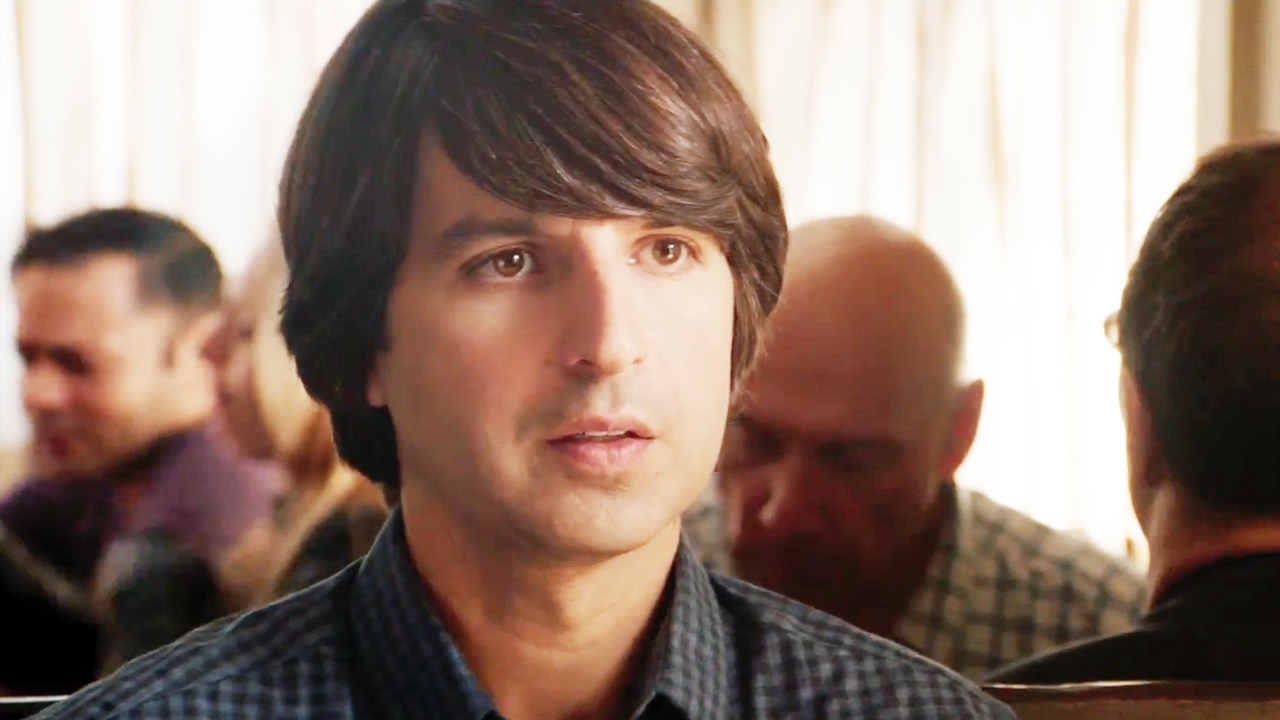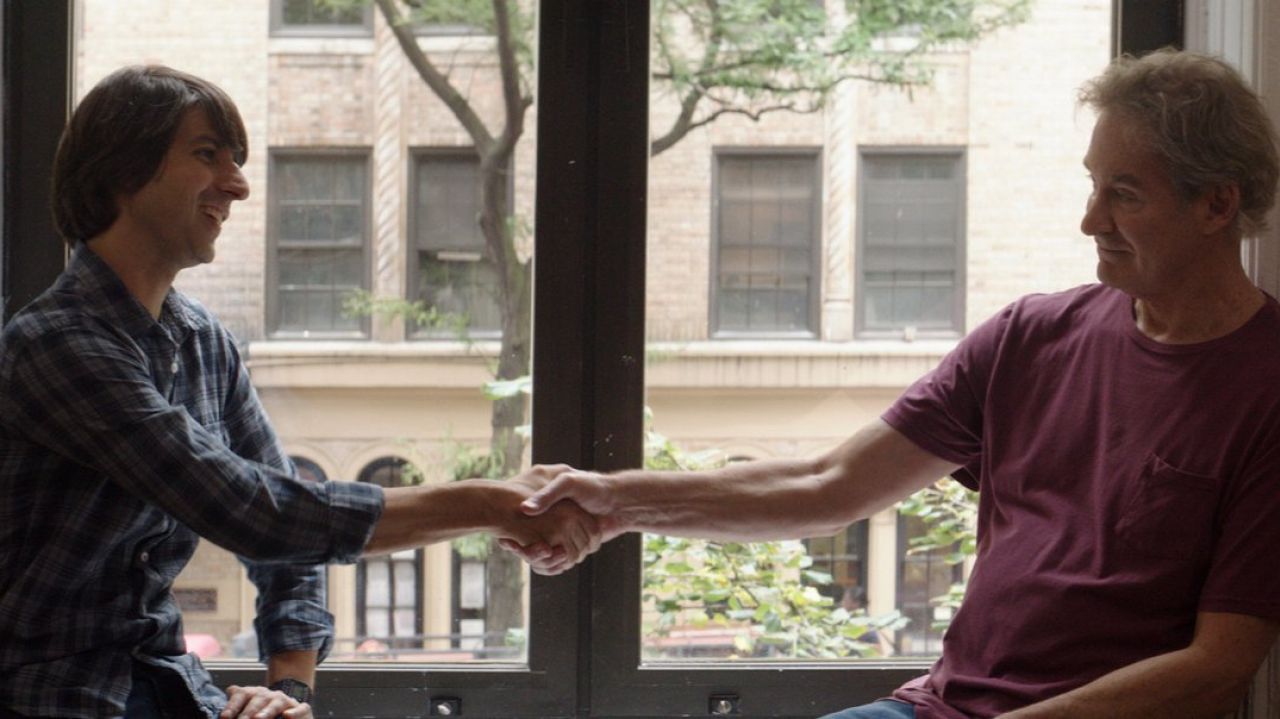Demetri Martin Discusses His Directorial Debut Dean

Comedian Demetri Martin talks about his directorial debut Dean, the lessons he learned, and the sources of his comedic inspiration.
Comedian Demetri Martin is about to bring his unique brand of visual humor to a new venue: the big screen. Although he has written screenplays before, Martin makes his directorial debut with the dramedy Dean, a film he also wrote and stars in. Dean centers on an illustrator named Dean (Martin) and his father Robert (Kevin Kline); both men struggle to regain a sense of normalcy as they cope with losing the most significant woman in their lives. Dean and Robert initially try to heal separately, embracing new adventures and relationships, but ultimately realize they must come together in their grief in order to find peace. Despite its serious-sounding premise, the film channels Martin’s offbeat sensibility to mine laughs from awkward social situations. Humorous drawings punctuate the movie as well, creating amusing transitions between heavier thoughts. The result is a funny, charming film that feels like Martin’s own.
The Independent’s Evan Crean spoke with Martin about what inspired him to direct, the lessons he learned from this experience, and where the ideas for his artwork and his comedy originate.
EC: You’ve written a couple of screenplays before Dean; what about this project made you decide to direct?
Demetri Martin: Probably the main thing was those projects were higher concept. I sold them as pitches. Then there were a couple of smaller ones that I have written; I guess they are also more concept-driven than this one. When I thought about the script and decided, whatever movie I’m gonna write, I’m gonna make this movie; it changed the way I wrote because I tried to be very practical about it and say alright, I can imagine shooting this scene and that one, and getting a location, and executing it, hopefully to the best of my ability as a newcomer to this domain. So that drove me to come up with a story that’s like the one you saw. It’s grounded in reality, and it’s a father and son. There’s no car chase or explosions or anything like that.
EC: (Laughing) That’s too bad.
Martin: (Laughing) That’s right; if I could have added that, it would have really been interesting.
EC: How did you attract Kevin Kline to the project?
Martin: My agent got it to his people; they got to him, and there was no guarantee. They were like, “Yeah, I think he’s gonna read it.” And then after he read it, they told me he’d like to have lunch. So I said, “Okay,” flew to New York, and had lunch with him. It went really well. He was really funny and charming. Movie aside, I’m a longtime Kevin Kline fan, so that was cool either way. But I knew going into that meeting that this one guy who was willing to finance a little more than half the movie had said that if we could get Kevin Kline, he’d give us the money.

EC: No pressure right?
Martin: Exactly. I really hoped that he’d respond, and he did enough, obviously. Took a little time, but he was into it, and that was probably the biggest piece of the puzzle that fell into place that allowed me to make the movie.
EC: What is the biggest lesson you learned directing for the first time?
Martin: There was a pile of lessons I didn’t even know were waiting for me to learn, many of which were difficult, but one of them I learned is that directing is a performance. Like on the day when you’re shooting, each day you turn up to the set, people are looking to you and at you, for better or worse, for guidance. Are we doing more of this? Less of this? I just didn’t quite realize how much you are performing, whether you want to or not. Not on camera or anything, just with your crew.
EC: You’ve talked about this idea in other interviews about the economy of words and how you write short jokes. Do you have a favorite short joke in the movie?
Martin: Hmm…an interesting question. You know there were a couple of things I liked that I got to do in the movie. When I set out to make a movie, I told myself I should try to play different games, or use different devices in the storytelling so it’s not just sort of straight, simple, old-fashioned – which there is nothing wrong with – but I wanted to challenge myself a little bit. So the drawings were part of that. I think there is a little bit of an almost silent film aspect in just a little couple of spots – or at least you can say visually-based comedy. One of them is when I’m on the altar at the wedding, my character sees his ex, and sees the guy looking at her in the crowd. I like that little sequence because that was kind of simple, but when I saw that it was getting laughs, I felt encouraged. I was like, “Cool, that’s like no dialogue, it’s not wordy, it’s just the physical, visual comedy.”
EC: Yeah, it’s really funny.
Martin: Yeah, I also like that bit in the kitchen where my character first sees Gillian’s character, the fall and stuff. It was cool to see that work because that was one of those things I really envisioned when I was writing it. I was like, “Oh, I’ve seen this slow-motion thing where the pretty woman is in slow motion,” but to cut back to the guy and somehow the slow-motion just doesn’t go away when it’s supposed to, and it just stays in slow-mo. Things like that, I can’t do in standup. That’s something I got to do specifically in a movie. I really like those bits.
EC: Those were two of my favorite moments in the movie. Could you talk about the role your illustrations play in the film, and how they interact with split-screen?
Martin: Sure. I had some illustrations from before making the movie. I did a book of line drawings. That was part of the reason I made the character an illustrator because I thought, I already have a running start here with drawings that exist. I can build off of those. I thought it would be a good way to show the viewer what he’s going through and how he’s changing, if at all. Then we shot the movie; we shot some of me drawing, so you could see him thinking with a pen. Then we get to the edit, and we realize, oh geez, there’s like no drawings for like 15 minutes all of a sudden. It was uneven. It was front-loaded. So that was something I had to work on. Through the edits, find the right spots to put in drawings to keep the pace. And the split-screen—when I wrote the script, I figured there would be some split-screen element that might be a way to show the drawings. But I didn’t quite understand how exactly to execute it. In the edit, the answer emerged. But there, too, I wanted to make sure it was balanced so that if I used the split screen, it wasn’t a sore thumb. I made sure to introduce it early enough and establish it so that it would work.
EC: I think it works really well.
DM: Thanks.
EC: Seeing your drawings in the film and seeing how they came together, I wondered where you got your ideas from.
Martin: A lot of them, it turns out, are very similar to my one-liners. This is where I’ve really come to respect and value daydreaming. What often seemed pointless to me, I’m older now, so I understand it’s a useful time for me, not to judge, but to let ideas free-associate. Often a good joke will come out of it. With drawing, it’s the same thing. Even sometimes I just draw…in the movie I tried to show that just moving the pen around. It’s almost like nonsense, and sometimes I can find meaning in something I drew or to lead me to something that’s the next joke.
EC: Last question, a broader comedy one. A lot of comedians are funny because they have a lot of tragedy and conflict in their backgrounds that inspire their work. Where does your sense of humor come from?
Martin: I was very lucky that my parents loved each other, and they loved me, and they didn’t beat me up, or each other, and nobody had any substance abuse problems or anything. I do feel very lucky. At the same time, I don’t have something that’s immediately clear to push off of when I’m doing comedy or sharing my perspective because I had a fortune childhood. We weren’t rich or anything, but again it was a very loving environment and supportive.
However, I did grow up on the Jersey Shore, where that show takes place, that was my high school. I was on the math team and the physics team, and I wasn’t good at team sports. Where I’m from, I’m considered a nerd and a dork, and all that stuff. So I was marginalized in a lot of ways, just socially. I wasn’t an outcast or anything; I just wasn’t considered cool. So I think maybe that informed my perspective a little bit, and I guess just daydreaming and letting my mind wander and valuing creativity, and trying to focus on the process of coming up with stuff has helped me find my sense of humor and my jokes. That’s why a lot of them are kind of daydreams.
EC: Well, it seems to be working for you.
Martin: Thanks so much.
Regions: Los Angeles, New York City, San Francisco
